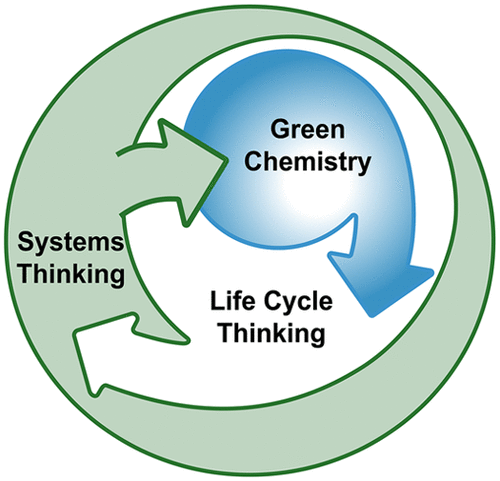当前位置:
X-MOL 学术
›
J. Chem. Educ.
›
论文详情
Our official English website, www.x-mol.net, welcomes your
feedback! (Note: you will need to create a separate account there.)
Experiential Learning To Promote Systems Thinking in Chemistry: Evaluating and Designing Sustainable Products in a Polymer Immersion Lab
Journal of Chemical Education ( IF 2.5 ) Pub Date : 2019-07-29 , DOI: 10.1021/acs.jchemed.9b00336 Aurora L. Ginzburg 1 , Casey E. Check 2 , Demetri P. Hovekamp 2 , Alyson N. Sillin 2 , Jack Brett 2 , Hannah Eshelman 2 , James E. Hutchison 1, 2
Journal of Chemical Education ( IF 2.5 ) Pub Date : 2019-07-29 , DOI: 10.1021/acs.jchemed.9b00336 Aurora L. Ginzburg 1 , Casey E. Check 2 , Demetri P. Hovekamp 2 , Alyson N. Sillin 2 , Jack Brett 2 , Hannah Eshelman 2 , James E. Hutchison 1, 2
Affiliation

|
The integrated application of green chemistry, life cycle thinking, and systems thinking has the potential to reduce environmental impacts related to the use and production of chemical products or materials. Life cycle and systems thinking are key perspectives needed to avoid the unintended consequences or unsubstantiated claims that inhibit development and adoption of more sustainable products. However, systems thinking is rarely taught in the chemistry curriculum. Students need experience evaluating the effects of products on societal and earth systems (i.e., using systems thinking) in order to anticipate trade-offs and make informed design decisions. To give students an immersive learning experience, we developed a sustainable product design project that brings together tools from green chemistry, life cycle thinking, and systems thinking. We found that this experiential learning approach gave students generalizable strategies for innovating and implementing sustainable practices in their current industrial positions. The project was divided into three workshops: in Workshop I they evaluated the life cycle impacts and toxicity for a material of concern, in Workshop II they measured the performance of this material and compared it to alternatives, and in Workshop III they designed a mock-product that was both high performing and environmentally friendly. We piloted this framework with master’s students evaluating polymer foams for use in an infant car seat; however, we envision this project being suitable for a range of other types of products. Moreover, we have suggested ways to adapt the duration and sophistication of the workshops to make them appropriate for a variety of course levels.
中文翻译:

体验式学习,以促进化学中的系统思维:在聚合物浸没实验室中评估和设计可持续产品
绿色化学,生命周期思维和系统思维的综合应用有可能减少与化学产品或材料的使用和生产有关的环境影响。生命周期和系统思考是避免阻碍开发和采用更可持续产品的意外后果或缺乏根据的主张所需要的关键观点。但是,在化学课程中很少教授系统思考。学生需要有经验来评估产品对社会和地球系统的影响(即,使用系统思维),以便预测取舍和做出明智的设计决策。为了给学生一个身临其境的学习体验,我们开发了一个可持续的产品设计项目,该项目将绿色化学,生命周期思维和系统思维等工具整合在一起。我们发现,这种体验式学习方法为学生提供了适用于他们当前行业职位的创新和实施可持续实践的通用策略。该项目分为三个工作坊:在工作坊I中,他们评估了所关注材料的生命周期影响和毒性;在工作坊II中,他们测量了该材料的性能并将其与替代品进行比较;在工作坊III中,他们设计了一个模拟模型,既高性能又环保的产品。我们与硕士生一起试用了该框架,评估了用于婴儿汽车座椅的聚合物泡沫。但是,我们认为该项目适用于一系列其他类型的产品。而且,
更新日期:2019-11-18
中文翻译:

体验式学习,以促进化学中的系统思维:在聚合物浸没实验室中评估和设计可持续产品
绿色化学,生命周期思维和系统思维的综合应用有可能减少与化学产品或材料的使用和生产有关的环境影响。生命周期和系统思考是避免阻碍开发和采用更可持续产品的意外后果或缺乏根据的主张所需要的关键观点。但是,在化学课程中很少教授系统思考。学生需要有经验来评估产品对社会和地球系统的影响(即,使用系统思维),以便预测取舍和做出明智的设计决策。为了给学生一个身临其境的学习体验,我们开发了一个可持续的产品设计项目,该项目将绿色化学,生命周期思维和系统思维等工具整合在一起。我们发现,这种体验式学习方法为学生提供了适用于他们当前行业职位的创新和实施可持续实践的通用策略。该项目分为三个工作坊:在工作坊I中,他们评估了所关注材料的生命周期影响和毒性;在工作坊II中,他们测量了该材料的性能并将其与替代品进行比较;在工作坊III中,他们设计了一个模拟模型,既高性能又环保的产品。我们与硕士生一起试用了该框架,评估了用于婴儿汽车座椅的聚合物泡沫。但是,我们认为该项目适用于一系列其他类型的产品。而且,































 京公网安备 11010802027423号
京公网安备 11010802027423号